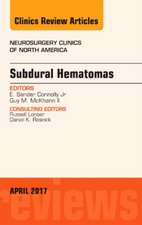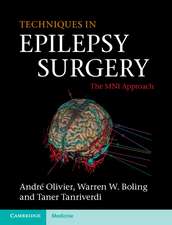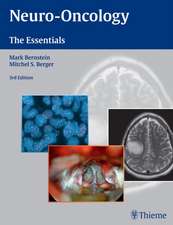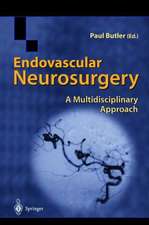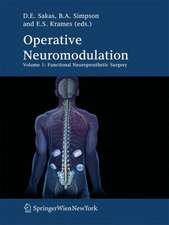Neurosurgical Ethics in Practice: Value-based Medicine
Editat de Ahmed Ammar, Mark Bernsteinen Limba Engleză Hardback – 17 iul 2014
| Toate formatele și edițiile | Preț | Express |
|---|---|---|
| Paperback (1) | 711.25 lei 38-44 zile | |
| Springer Berlin, Heidelberg – 23 aug 2016 | 711.25 lei 38-44 zile | |
| Hardback (1) | 1103.03 lei 22-36 zile | |
| Springer Berlin, Heidelberg – 17 iul 2014 | 1103.03 lei 22-36 zile |
Preț: 1103.03 lei
Preț vechi: 1161.08 lei
-5% Nou
Puncte Express: 1655
Preț estimativ în valută:
211.07€ • 220.93$ • 175.67£
211.07€ • 220.93$ • 175.67£
Carte disponibilă
Livrare economică 10-24 martie
Preluare comenzi: 021 569.72.76
Specificații
ISBN-13: 9783642549793
ISBN-10: 3642549799
Pagini: 286
Ilustrații: XII, 286 p. 22 illus., 8 illus. in color.
Dimensiuni: 155 x 235 x 20 mm
Greutate: 0.64 kg
Ediția:2014
Editura: Springer Berlin, Heidelberg
Colecția Springer
Locul publicării:Berlin, Heidelberg, Germany
ISBN-10: 3642549799
Pagini: 286
Ilustrații: XII, 286 p. 22 illus., 8 illus. in color.
Dimensiuni: 155 x 235 x 20 mm
Greutate: 0.64 kg
Ediția:2014
Editura: Springer Berlin, Heidelberg
Colecția Springer
Locul publicării:Berlin, Heidelberg, Germany
Public țintă
Professional/practitionerCuprins
Introduction.- Ethics in Medicine and Surgery – General View. Patient`s Rights: Patient`s Rights – Overview.- Patient´s Rights to Refuse Treatment.- Patient Right to Privacy and Confidentiality.- Informed Consent.- Patient`s Family`s Rights.- Children and Neonates.- Patients with Terminal Diseases.- Complications and Errors. Work Environment: Neurosurgeon`s Rights and Duties.- Priority Setting.- Neuroethics.- Workplace Ethics. Society: Ethics of Performing Surgery/Using Technology for the First Time.- Research Ethics.- Training in Neurosurgery - the Right of Patients and of Trainees.- Conflict of Interest/Industry-Surgeon Relationship.- Malpractice and Court Cases.- Media and Neurosurgery.
Recenzii
“The editors, who have co-authored many of the included chapters, are to be congratulated on their extremely valuable overview of ethics in neurosurgery. … The writing is very clear and will be easily understandable for neurosurgeons and trainees without prior knowledge of ethics. … this book shows that the ethical challenges in neurosurgery are numerous and can help neurosurgeons identify and manage them, thus contributing to the profession.” (Marike L. D. Broekman, Acta Neurochirurgica, Vol. 160 (8), August, 2018)
“The book is multi-authored and directed at neurosurgeons in practice and in training. … The very good thing about this book is that it is well formatted and configured, short, approachable, readable, and systematic. On the whole, the use of intercalated cases followed by discussions works well. … The editors have made an important contribution to the profession. It will be of interest to neurosurgeons seeking an overview of medical ethics, ethical methodology, and practical neurosurgical ethics.” (T. Forcht Dagi, Neurosurgery, Vol. 82 (4), April, 2018)
From the book reviews:
“This book examines a multitude of ethical issues in the field of neurosurgery. It is broad in scope and uses frequent clinical vignettes to illustrate ethical dilemmas. The intent is to provide analyses of ethical issues faced by neurosurgeons on a daily basis. The book clearly targets neurosurgical practitioners, both practicing surgeons and trainees.” (Jay R. Malone, Doody’s Book Reviews, January, 2015)
“The book is multi-authored and directed at neurosurgeons in practice and in training. … The very good thing about this book is that it is well formatted and configured, short, approachable, readable, and systematic. On the whole, the use of intercalated cases followed by discussions works well. … The editors have made an important contribution to the profession. It will be of interest to neurosurgeons seeking an overview of medical ethics, ethical methodology, and practical neurosurgical ethics.” (T. Forcht Dagi, Neurosurgery, Vol. 82 (4), April, 2018)
From the book reviews:
“This book examines a multitude of ethical issues in the field of neurosurgery. It is broad in scope and uses frequent clinical vignettes to illustrate ethical dilemmas. The intent is to provide analyses of ethical issues faced by neurosurgeons on a daily basis. The book clearly targets neurosurgical practitioners, both practicing surgeons and trainees.” (Jay R. Malone, Doody’s Book Reviews, January, 2015)
Notă biografică
Ahmed Ammar, M.B.Ch.B., D.M.Sc., FACS, FICS, is Professor and Consultant Neurosurgeon at Dammam University, Dammam, Saudi Arabia and Visiting Professor in the Departments of Neurosurgery at the University of Virginia, USA and the University of Shinshu, Matsumoto, Japan. He is a vastly experienced neurosurgeon who has performed more than 5000 procedures, primarily in spinal surgery, pediatric neurosurgery, and functional neurosurgery. Dr. Ammar has served as a member of the Ethics Committee of the World Association of Neurological Surgeons and as Chair of the Ethics Committee of the World Association of Disaster and Emergency Medicine. He has also been a member of the Education Committee of the International Pediatric Neurosurgical Society and a board member of the Saudi Association for Neurological Surgeons and the Gulf Neurosurgical Societies. Dr. Ammar has published more than 50 papers in peer-reviewed journals as well as several books, and is a member of the International Advisory Board of the Asian Journal of Neurosurgery.
Mark Aaron Bernstein, BSc, MD, FRCSC (Neurosurgery), MHSc (Bioethics), currently works as a scientist at the Toronto Western Hospital/University Health Network, Toronto, Ontario, Canada. He has been a staff member at Toronto Western Hospital and also Hillcrest Hospital, Toronto, for more than 25 years, and in 1996 was appointed Professor in the Department of Surgery at the University of Toronto. Dr. Bernstein has had a distinguished career that has included service on numerous committees of medical and scientific bodies and extensive research activity, including on ethical and social issues relating to neurosurgery. He has been Associate Director of the Arthur and Sonia Labatt Brain Tumour Research Centre since 1999. In 2006 Dr. Bernstein was invited to deliver the Theodore Kurze lecture to the American Association of Neurological Surgeons and in 2011 he was appointed as the inaugural Greg Wilkins-Barrick Chair in International Surgery at the University Health Network, Toronto. Dr. Bernstein serves on the editorial boards of Brain Tumor Pathology, Journal of Neuro-Oncology, Neurosurgery Quarterly, and National Review of Medicine. He is the author of more than 275 articles in peer-reviewed journals.
Textul de pe ultima copertă
Good neurosurgical practice is based not only on evidence, skills, and modern equipment, but also on good values. Young surgeons often learn about ethical behavior by observing the behavior of their teachers in different situations, but for several reasons, this is not enough. This book discusses the ethical issues that arise during the daily practice of neurosurgery. It will be especially informative for neurosurgeons, other surgeons, physicians, residents, medical students, and allied health care providers. The book is not a philosophical expose but an easily readable and highly practical road map on how to navigate ethically challenging situations in neurosurgical and other practice.
The book is divided into five parts addressing general issues, patients’ rights, end of life issues, neurosurgeons’ duties, and neurosurgeons and society. The contributing authors are well-established neurosurgeons and other doctors with long experience and from different backgrounds. They discuss ethical problems encountered in everyday practice, introduced by cases, and in all, there are more than 50 neurosurgical cases drawn from real life. The editors introduce in the title and throughout the book the term “value-based medicine” which reinforces that while modern medicine and surgery have come very far in technical aspects, the core of what we do must be based on the values embodied in bioethics.
The book is divided into five parts addressing general issues, patients’ rights, end of life issues, neurosurgeons’ duties, and neurosurgeons and society. The contributing authors are well-established neurosurgeons and other doctors with long experience and from different backgrounds. They discuss ethical problems encountered in everyday practice, introduced by cases, and in all, there are more than 50 neurosurgical cases drawn from real life. The editors introduce in the title and throughout the book the term “value-based medicine” which reinforces that while modern medicine and surgery have come very far in technical aspects, the core of what we do must be based on the values embodied in bioethics.
Caracteristici
First book to focus on the ethical dilemmas confronted in daily neurosurgical practice Guide to good neurosurgical practice based on good values Reports and discusses more than 50 neurosurgical cases from an ethical point of view

